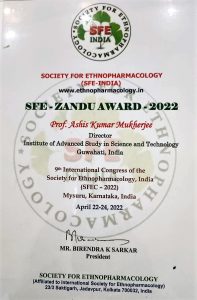Prof. Ashis K. Mukherjee, Director, IASST Guwahati has bagged the prestigious SFE Zandu Award 2022 for his remarkable contribution for the development of drugs for the treatment of snakebite and thrombosis-associated cardiovascular diseases from plants and other natural resources. This award constituted by the Emami, and Indian Conglomerate Company was conferred to him during the 9th International Congress of Society for Ethnopharmacology held during 22-24 April, 2022 at Mysuru, Karnatka. Snakebite is declared as a Tropical Neglected Disease by the World Health Organization and for more than 25 years Prof. Ashis K. Mukherjee has been pursuing research on pharmacological reassessment of medicinal plants used traditionally for the treatment of snakebite patients, but without scientific validation. He demonstrated the usefulness of several traditional medicinal plants, for example, the root of Mimosa pudica and Rauwolfia serpentina, and leaves of Azadirachta indica, as antidotes against snakebite envenoming.
Cardiovascular diseases (CVDs) are the primary cause of mortality and morbidity worldwide, and the currently used antithrombotic drugs are not free of adverse effects. Therefore, the search for safe, potent, and effective antithrombotic drugs may benefit from exploring naturally bioactive molecules from traditional medicinal plants. Prof. Mukherjee has made a significant contribution in identifying the traditional medicinal plants used for treating CVDs, active phytochemicals and their mechanism of cardioprotective action, understanding the antithrombotic potential of herbal drug prototypes, and pointing to their future clinical use as potent antithrombotic drugs. Prof. Mukherjee has also been working on the phytochemical marker(s)-assisted quality control of traditional herbal medicines that can prevent batch-to-batch variations in their quality and production and, therefore, can gain the acceptance of consumers and clinicians. This approach can certainly augment the commercialization and globalization of traditional herbal drugs. Recently Govt. of India has signed a memorandum of agreement with World Health Organization for establishing the global center for traditional medicine in India. Prof. Mukherjee took a keen interest in identifying and conserving medicinal plants of the region, and he has developed a traditional medicinal plants garden at IASST campus. His team is also working on ethnic functional foods in northeast India. They recently discovered the next-generation probiotic bacterium Lactobacillus plantarum JBC5 from a traditional dairy product prepared by an ethnic group of Assam that shows great promise in promoting healthy aging. Prof. Mukherjee said that we should give our best effort for the conservation of biodiversity, traditional medicinal plants, and cultural heritage in this region.










